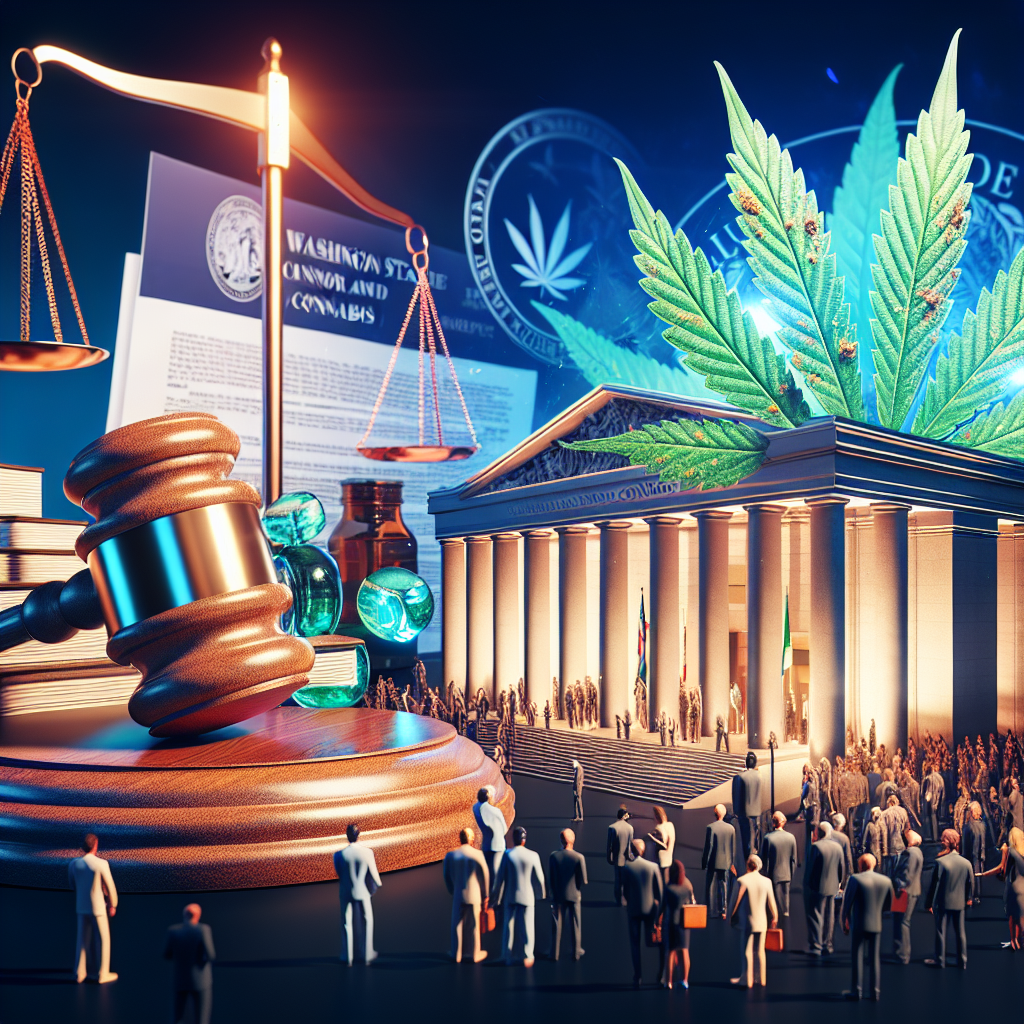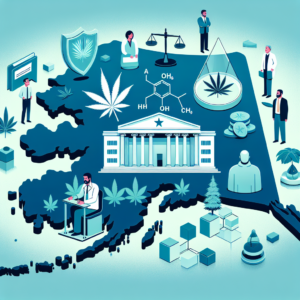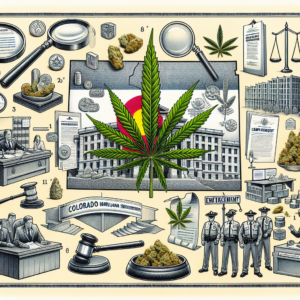Contents
Introduction to Delta-9 THC
Delta-9 tetrahydrocannabinol (THC) is a prominent cannabinoid found in cannabis plants, renowned for its psychoactive effects and therapeutic potential. As cannabis legalization spreads, Delta-9 THC has emerged at the forefront of discussions surrounding cannabis use, garnering increasing attention for both its recreational and medicinal properties.
Amidst this growing interest in Delta-9 THC, the legal landscape surrounding cannabinoids has become increasingly complex. One significant aspect of this complexity involves the distinction between Delta-9 THC and its analogue, Delta-8 THC. While Delta-9 THC is well-known for its psychoactive effects, Delta-8 THC has gained traction for its purported milder psychoactive properties and potential legal loopholes.
Understanding the legal status of Delta-8 THC and its differentiation from Delta-9 THC is crucial for navigating the regulatory framework governing cannabis and cannabinoids. In many jurisdictions, including Washington, state laws and regulations dictate the legality of Delta-9 THC products, influencing everything from production and distribution to consumer access and enforcement.
This comprehensive overview will delve into the legal landscape of Delta-9 THC in Washington, examining the current state laws and regulations, recent legislative developments, enforcement and compliance measures, consumer access and availability, industry perspectives, public perception, potential future changes, and legal considerations for consumers. By exploring these facets, we aim to provide a thorough understanding of the legality of Delta-9 THC in Washington and its implications for individuals and businesses within the state.
State-specific Legal Framework
Washington state boasts a well-established legal framework governing cannabis and cannabinoids, reflecting its progressive stance on cannabis legalization. Under Washington law, cannabis is broadly defined to include various parts of the cannabis plant, including derivatives such as Delta-9 THC.
Delta-9 THC fits within existing state laws and definitions of cannabis products, subject to specific regulations governing its cultivation, manufacturing, distribution, and sale. The Washington State Liquor and Cannabis Board (LCB) serves as the primary regulatory authority overseeing the cannabis industry in the state, responsible for licensing and regulating cannabis businesses.
The legalization of recreational cannabis use for adults in Washington, enacted through Initiative 502 in 2012, has laid the foundation for a robust and regulated cannabis market. However, the legal framework surrounding Delta-9 THC within the state is multifaceted, encompassing various statutes, regulations, and administrative guidelines.
Key aspects of the state-specific legal framework for Delta-9 THC in Washington include licensing requirements for cannabis businesses, product testing and quality control measures, labeling and packaging regulations, advertising restrictions, and taxation policies. These regulations aim to ensure consumer safety, promote public health, and prevent diversion to the illicit market.
Overall, the state-specific legal framework for Delta-9 THC in Washington provides a comprehensive framework for regulating cannabis and cannabinoid products. By adhering to these regulations, businesses and individuals can contribute to the integrity and sustainability of the cannabis industry while promoting responsible consumption and compliance with state laws.
Recent Legislative Developments
Washington state has seen several recent legislative actions and regulatory changes related to Delta-9 THC, reflecting ongoing efforts to adapt to evolving industry dynamics and consumer needs. These developments have implications for the legality and regulation of Delta-9 THC products within the state.
One notable legislative development is the passage of Senate Bill 5370 in 2023, which introduced several amendments to Washington’s cannabis laws. Among other provisions, SB 5370 expanded the authority of the Washington State Liquor and Cannabis Board (LCB) to regulate cannabis products, including Delta-9 THC, and imposed new requirements for product testing, labeling, and advertising.
Furthermore, the Washington State Legislature has considered various bills aimed at addressing specific issues within the cannabis industry. For example, House Bill 1443, introduced in 2024, sought to establish regulations for the production and sale of cannabis-infused beverages, including those containing Delta-9 THC. The bill aimed to provide clarity and consistency in the regulation of cannabis-infused products.
Additionally, regulatory agencies such as the LCB have continued to promulgate new rules and guidelines governing the cannabis industry, including Delta-9 THC products. These regulations often address issues such as potency limits, product packaging, and advertising restrictions, aiming to protect consumer health and safety.
Overall, recent legislative developments in Washington reflect the state’s ongoing efforts to refine and optimize its regulatory framework for Delta-9 THC and other cannabis products. By staying abreast of these changes, stakeholders in the cannabis industry can adapt their practices to comply with evolving legal requirements and promote responsible consumption.
Enforcement and Compliance
Enforcement and compliance with Delta-9 THC laws in Washington are crucial for maintaining the integrity of the state’s cannabis industry and ensuring consumer safety. Regulatory agencies, such as the Washington State Liquor and Cannabis Board (LCB) and local law enforcement agencies, play a key role in interpreting and enforcing cannabis regulations.
Enforcement agencies interpret and enforce Delta-9 THC laws based on established statutes, regulations, and guidelines. This includes conducting inspections of cannabis facilities, investigating complaints of non-compliance, and taking enforcement actions against violators. Penalties for non-compliance can range from fines and license suspensions to criminal prosecution, depending on the severity of the violation.
Additionally, compliance with Delta-9 THC laws extends beyond regulatory requirements to include adherence to taxation and licensing obligations. Cannabis businesses are subject to various taxes, including excise taxes and sales taxes, which must be collected and remitted to state and local authorities.
To ensure compliance with Delta-9 THC laws, businesses and individuals involved in the cannabis industry must stay informed about the latest regulations and guidelines issued by regulatory agencies. This includes implementing robust compliance programs, conducting regular internal audits, and seeking legal guidance when necessary.
By prioritizing enforcement and compliance with Delta-9 THC laws, Washington state can maintain a safe and transparent cannabis market that protects both consumers and businesses. Additionally, ongoing efforts to enforce regulations and combat illicit cannabis activity contribute to public health and safety across the state.
Consumer Access and Availability
The availability of Delta-9 THC products in Washington is influenced by a combination of regulatory factors, market dynamics, and consumer demand. While Washington has a well-established cannabis market, consumer access to Delta-9 THC products is subject to certain restrictions and limitations.
Under Washington state law, only licensed cannabis retailers are authorized to sell Delta-9 THC products to consumers. These retailers must adhere to strict regulations regarding product testing, labeling, and packaging to ensure consumer safety and transparency. Additionally, cannabis products, including Delta-9 THC, must undergo rigorous testing for potency, contaminants, and pesticides before they can be sold to consumers.
Consumers can legally purchase Delta-9 THC products from licensed cannabis dispensaries and retail stores throughout Washington. However, access to these products may vary depending on factors such as geographic location, product availability, and pricing. Some areas may have a higher concentration of licensed dispensaries, providing greater access to Delta-9 THC products, while others may have limited options.
Furthermore, consumers must be at least 21 years old to purchase and possess cannabis products, including Delta-9 THC, for recreational use in Washington. Medical cannabis patients with valid recommendations from healthcare providers may purchase cannabis products at a younger age, but they must obtain a medical cannabis authorization card from the Washington State Department of Health.
Overall, consumer access to Delta-9 THC products in Washington is governed by a combination of regulatory requirements, market dynamics, and consumer preferences. By ensuring compliance with state laws and regulations, licensed cannabis retailers play a crucial role in providing safe and legal access to Delta-9 THC products for adult consumers across the state.
Industry Perspectives
Insights from industry stakeholders provide valuable perspectives on the legal landscape surrounding Delta-9 THC in Washington. Producers, retailers, and advocacy groups within the cannabis industry offer unique insights into the challenges and opportunities presented by current regulations and market dynamics.
Delta-9 THC producers face various regulatory challenges, including compliance with testing and labeling requirements, licensing restrictions, and taxation obligations. Additionally, market competition, consumer preferences, and supply chain management influence production strategies and business operations.
Retailers play a critical role in the distribution and sale of Delta-9 THC products to consumers, navigating regulatory requirements while striving to meet consumer demand for quality products and experiences. Retailers must maintain compliance with licensing, packaging, and advertising regulations while adapting to evolving market trends and consumer preferences.
Advocacy groups within the cannabis industry advocate for policy reforms and regulatory changes to support the growth and sustainability of the industry. These groups work to educate policymakers, engage with community stakeholders, and mobilize public support for cannabis legalization and regulatory reform initiatives.
Overall, industry perspectives on Delta-9 THC regulation in Washington reflect a diverse range of viewpoints and experiences, highlighting the complex interplay between legal, economic, and social factors shaping the cannabis industry. By fostering dialogue and collaboration among stakeholders, the industry can work towards a more equitable and sustainable regulatory framework that meets the needs of consumers, businesses, and communities.
Public Perception and Awareness
Public perception and awareness of Delta-9 THC in Washington are influenced by a variety of factors, including media coverage, cultural attitudes, and personal experiences. While cannabis legalization has gained significant support in the state, attitudes towards Delta-9 THC and its use may vary among different demographic groups.
Media coverage plays a crucial role in shaping public perception of Delta-9 THC, with news outlets often highlighting stories related to cannabis legalization, industry developments, and regulatory issues. Positive portrayals of cannabis use for medical purposes and the emerging cannabis industry may contribute to greater acceptance and normalization of Delta-9 THC.
Cultural attitudes towards cannabis use also play a significant role in shaping public perception of Delta-9 THC. While some individuals may view cannabis use as socially acceptable or even beneficial, others may hold more conservative views and harbor concerns about potential health risks and societal implications.
Personal experiences with Delta-9 THC and cannabis products can also impact individuals’ perceptions and attitudes. Positive experiences with cannabis for medical or recreational purposes may foster greater acceptance and support for Delta-9 THC legalization, while negative experiences or perceptions of harm may lead to skepticism or opposition.
Overall, public perception and awareness of Delta-9 THC in Washington are dynamic and multifaceted, reflecting a complex interplay of social, cultural, and political factors. As attitudes towards cannabis continue to evolve and legalization efforts progress, ongoing education and dialogue are essential to promote informed decision-making and address misconceptions surrounding Delta-9 THC and its use.
Potential Future Changes
Speculating on potential future changes to Delta-9 THC laws and regulations in Washington involves considering various factors that may influence legislative or regulatory decisions in the state. As attitudes towards cannabis evolve and the cannabis industry continues to develop, several key trends and developments may shape the future legal landscape of Delta-9 THC.
One potential factor is ongoing legislative efforts to refine and expand Washington’s cannabis regulatory framework. Lawmakers may introduce new bills or amend existing laws to address emerging issues, promote equity and social justice within the industry, and respond to evolving consumer demands.
Furthermore, shifts in federal cannabis policy and enforcement priorities could have significant implications for Delta-9 THC regulation in Washington. Changes at the federal level, such as rescheduling or descheduling cannabis, could provide greater clarity and flexibility for state regulators and industry stakeholders.
Additionally, advancements in cannabis research and technology may influence regulatory decisions regarding Delta-9 THC. Scientific studies on the therapeutic effects, safety profile, and potential risks of Delta-9 THC could inform policymaking and shape public health initiatives.
Moreover, public opinion and grassroots advocacy efforts play a crucial role in shaping cannabis policy and regulation. Increased awareness and support for cannabis legalization, coupled with community engagement and activism, may drive momentum for further reforms at the state and local levels.
Overall, while the future of Delta-9 THC regulation in Washington remains uncertain, ongoing developments in law, policy, science, and public opinion suggest that further changes are likely on the horizon. By staying informed and engaged, stakeholders can help shape the future of cannabis regulation in Washington and ensure that policies align with the needs and priorities of the community.
Legal Considerations for Consumers
For consumers in Washington, understanding and navigating the legal landscape of Delta-9 THC is essential to ensure compliance with state laws and regulations. Whether purchasing cannabis products for medical or recreational use, consumers should be aware of their rights and responsibilities under Washington’s cannabis laws.
First and foremost, consumers should only purchase Delta-9 THC products from licensed cannabis retailers operating legally in the state. Licensed retailers are required to adhere to strict regulations regarding product testing, labeling, and packaging, which helps ensure the safety and quality of cannabis products.
Additionally, consumers must be at least 21 years old to purchase and possess cannabis products, including Delta-9 THC, for recreational use in Washington. Medical cannabis patients with valid recommendations from healthcare providers may purchase cannabis products at a younger age, but they must obtain a medical cannabis authorization card from the Washington State Department of Health.
When purchasing Delta-9 THC products, consumers should also be mindful of dosage and consumption methods to avoid unintentional overconsumption or misuse. It’s essential to start with a low dose and gradually increase as needed,
especially for novice users or individuals with lower tolerance levels.
Furthermore, consumers should be aware of restrictions on public consumption and driving under the influence of cannabis. Consuming cannabis in public places where smoking is prohibited is illegal, and driving under the influence of cannabis can result in legal penalties, including fines, license suspension, and criminal charges.
Finally, consumers should stay informed about the latest developments in Delta-9 THC laws and regulations in Washington. This includes keeping up-to-date with changes in legislation, regulatory guidance, and enforcement practices that may impact the legality and availability of cannabis products.
By understanding and adhering to these legal considerations, consumers can make informed decisions when purchasing and using Delta-9 THC products in Washington, ensuring compliance with state laws and regulations while promoting responsible and safe consumption practices.
Conclusion
In conclusion, the legality of Delta-9 THC in Washington is governed by a comprehensive regulatory framework that reflects the state’s progressive approach to cannabis legalization. Delta-9 THC, along with other cannabinoids, is subject to specific laws and regulations that aim to ensure consumer safety, promote public health, and prevent diversion to the illicit market.
The state-specific legal framework for Delta-9 THC in Washington encompasses various statutes, regulations, and administrative guidelines overseen by regulatory agencies such as the Washington State Liquor and Cannabis Board (LCB). Recent legislative developments and regulatory changes have further refined and optimized Washington’s cannabis regulatory framework, addressing emerging issues and adapting to evolving industry dynamics.
Enforcement and compliance with Delta-9 THC laws are essential for maintaining the integrity of Washington’s cannabis industry and protecting consumers from harm. Regulatory agencies and law enforcement agencies work together to monitor and enforce compliance with established regulations, ensuring that licensed cannabis businesses operate responsibly and transparently.
Consumer access to Delta-9 THC products in Washington is facilitated through licensed cannabis retailers, who play a crucial role in providing safe and legal access to cannabis products for adult consumers. By adhering to state laws and regulations, consumers can make informed decisions when purchasing and using Delta-9 THC products, promoting responsible consumption and compliance with legal requirements.
Overall, while challenges and uncertainties remain, the future outlook for Delta-9 THC regulation in Washington is shaped by ongoing legislative efforts, industry trends, public perception, and advocacy initiatives. By fostering dialogue and collaboration among stakeholders, Washington can continue to lead the way in cannabis legalization and regulation, ensuring that policies align with the needs and priorities of the community.


